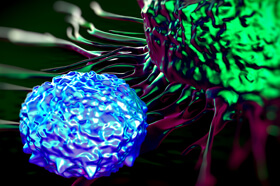Researchers Propose Method for Predicting Immunotherapy Benefit in Colorectal Cancer Patients
 Mayo Clinic Comprehensive Cancer Center researchers have identified key findings that can assist clinicians in predicting whether a patient with advanced colorectal cancer will benefit from immunotherapy. Published in the journal Clinical Cancer Research, the study highlights the potential of using spatial analysis of specific proteins as a predictive tool for selecting appropriate candidates for PD-1 blockade immunotherapy in colorectal cancer, ultimately improving treatment outcomes and minimizing unnecessary treatments.
Mayo Clinic Comprehensive Cancer Center researchers have identified key findings that can assist clinicians in predicting whether a patient with advanced colorectal cancer will benefit from immunotherapy. Published in the journal Clinical Cancer Research, the study highlights the potential of using spatial analysis of specific proteins as a predictive tool for selecting appropriate candidates for PD-1 blockade immunotherapy in colorectal cancer, ultimately improving treatment outcomes and minimizing unnecessary treatments.
The study authors found that the distance between cells that express programmed cell death protein 1 (PD-1) and programmed cell death ligand 1 (PD-L1) within the tumor can predict the outcome of immunotherapy in colorectal cancers with a defective DNA repair system, known as mismatch repair. PD-1 and PD-L1 are immune checkpoint proteins, primarily located on the surface of immune cells, whose binding is blocked by drugs known as checkpoint inhibitors.
"The finding suggests that this spatial analysis within tumors may be useful to select patients who are more likely to benefit from immunotherapy," says Frank Sinicrope, MD, medical oncologist and gastroenterologist at Mayo Clinic Comprehensive Cancer Center. "If cells expressing these proteins were at or within 10 microns of each other within the tumor, then immunotherapy treatment was able to significantly improve patient survival. This finding suggests a critical threshold for effective blockade of the PD-1/PD-L1 axis."
While immunotherapy continues to advance cancer treatment, not all patients with metastatic colorectal cancer who have a defective DNA repair system benefit from this treatment. Accordingly, there is a need for predictive biomarkers of response and survival, adds Dr Sinicrope, lead author of the study.
According to the researchers, among the patient tumors that were examined, 60% had an increased number of cells with PD-1 and PD-L1 in close proximity, meaning that 60% of these patients are likely to benefit from immunotherapy. Furthermore, such data has the potential to assist clinicians in selecting patients for treatment while the other 40% who are less likely to benefit from immunotherapy could be treated with combination therapy or another type of treatment.
The researchers share that they are in the process of validating their findings, and if the results can be validated, the finding would allow patient selection of those most likely to benefit from PD-1 blockade, and spare patients not likely to benefit from it the potential toxicity and cost of the drug.
"To our knowledge, this is the first report of this finding in colorectal cancer; however, reports showing the
importance of PD-1 and PD-L1 proximity have been reported in melanoma and non-small cell lung Colorectal Cancer cancer," says Dr Sinicrope. "While our results are promising, the study data await validation in an independent cohort so are not yet ready to be used in clinical practice."